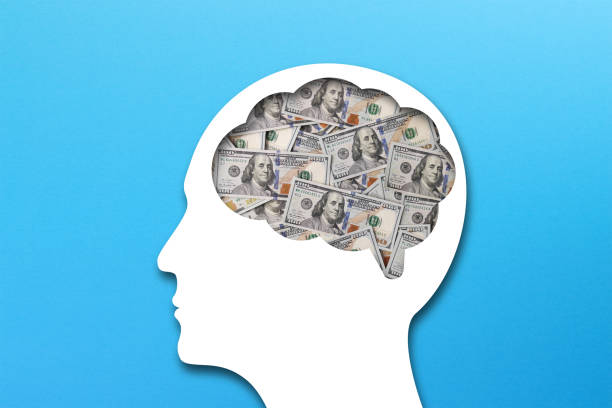Money is often imagined as something cold, logical, and detached—a world of numbers, equations, and bank accounts. But in truth, money is profoundly emotional. It is not just a tool of exchange, but a mirror of our fears, hopes, dreams, and insecurities. A paycheck is not simply a slip of paper; it is a symbol of security, freedom, and self-worth. A purchase is not just a transaction; it is a reflection of identity, desire, and sometimes even pain.
The psychology of money reminds us that when we spend, save, or invest, we are not only moving numbers around—we are negotiating with our own minds. The way we handle money reveals hidden stories about who we are and what we value. Understanding these psychological forces can change not only our financial health but also our emotional well-being.
Why Money and the Mind Are Inseparable
Money, unlike food or shelter, is an abstract concept. A piece of paper, a digital number on a screen, or a metal coin has no intrinsic value. Its power lies in what it represents: safety, opportunities, status, love, or survival. Because of this, our brains do not process money as just an object. Instead, money activates emotions like joy, fear, pride, and shame.
Neuroscience studies show that spending money can trigger the same reward pathways in the brain as delicious food or addictive substances. At the same time, losing money activates the brain’s pain centers, making financial loss feel physically distressing. In other words, the psychology of money is not simply about rational decisions—it is about survival, pleasure, and fear intertwined in the circuits of the brain.
Childhood Lessons: Where Our Money Stories Begin
Our relationship with money does not start when we open our first bank account—it begins in childhood. The way our parents handled money leaves a deep imprint on how we view spending and saving.
If you grew up in a household where money was scarce, you may carry anxiety about spending, even when you have enough. On the other hand, if you witnessed careless spending, you may unconsciously repeat that pattern as an adult. Psychologists call these “money scripts”—unconscious beliefs about money formed in early life.
A child who hears, “We can’t afford that,” may grow up believing money is always out of reach. Another who hears, “Money is the key to happiness,” may chase wealth endlessly, never feeling content. These invisible money scripts quietly guide adult behavior, shaping whether we become savers, spenders, or even avoiders who ignore financial realities.
The Tug-of-War Between Instant Gratification and Future Security
One of the most powerful psychological battles in money is the conflict between instant gratification and long-term goals. Our brains evolved in environments where immediate rewards—food, warmth, safety—meant survival. Waiting for distant benefits often meant risking everything.
Today, however, this wiring clashes with modern financial needs. Retirement savings, investments, and debt repayment all require sacrificing in the present for rewards decades away. Yet when we see a shiny gadget, a luxury trip, or a tempting online sale, our brain lights up with desire. The future feels distant, almost unreal, while the present is vivid and irresistible.
This is why credit cards are so powerful. They allow us to enjoy the reward instantly while postponing the pain of payment. Behavioral economists call this “temporal discounting”—the tendency to value immediate rewards more than future ones. Recognizing this bias is the first step toward overcoming it.
The Pain of Paying and the Pleasure of Spending
Every financial decision is shaped by two forces: the pleasure of gaining something and the pain of losing money. This “pain of paying” explains why cash feels harder to spend than a credit card. Handing over physical money makes the loss visible, while swiping a card feels almost abstract.
Research shows that people spend significantly more when using cards instead of cash. Digital payments like Apple Pay or contactless swipes reduce the psychological friction even further, making spending almost painless. This is convenient, but it can also be dangerous—because the less we feel the pain of paying, the more likely we are to overspend.
Yet spending also brings joy. Buying a gift for someone we love activates the brain’s reward centers. Experiences—like travel, concerts, or dinners with friends—often bring more lasting happiness than material goods. Understanding this balance between pain and pleasure can help us align spending with values rather than impulses.
The Illusion of Status and the Social Side of Money
Money is never just personal—it is deeply social. We use it not only to meet our needs but also to signal who we are. The car we drive, the clothes we wear, and the restaurants we choose all communicate status. Psychologists call this “conspicuous consumption,” the tendency to buy things not just for their use but for the impression they create.
This urge has evolutionary roots. In ancestral times, displaying resources signaled strength, fertility, and survival potential. In modern times, it translates into luxury goods, designer brands, and lifestyle choices. The danger is that chasing status through spending often leads to debt, dissatisfaction, and a cycle of never feeling enough.
Ironically, research shows that once basic needs are met, material possessions bring diminishing returns on happiness. What truly satisfies us is not outshining others, but building security, freedom, and meaningful connections.
The Fear of Loss and Risk Aversion
Human psychology is wired to fear losses more than we enjoy gains. Behavioral economists call this “loss aversion.” Losing $100 feels more painful than gaining $100 feels joyful. This bias influences everything from stock market behavior to everyday spending.
For example, investors often hold on to losing stocks longer than they should, hoping to avoid admitting defeat. Others avoid investing at all, keeping money in low-yield accounts out of fear of risk. While caution protects us from reckless decisions, excessive fear of loss can paralyze growth.
Understanding loss aversion helps us realize that fear often exaggerates the risks. Rationally, investing steadily over time is safer than doing nothing, but our emotional brain resists the idea of short-term losses. Recognizing this conflict between logic and emotion can help us make wiser financial choices.
Money and Identity
Money does not just buy things—it shapes who we believe we are. Some people equate financial success with self-worth, feeling valuable only when their income or possessions are high. Others define themselves by frugality, finding pride in saving every penny.
This fusion of money and identity can be empowering when it aligns with values. For example, someone who sees themselves as generous may use money to support charities or family members. But it can also be destructive. If self-worth depends on wealth, financial setbacks can shatter confidence.
Psychologists encourage separating self-identity from financial status. You are not your bank account. Money is a tool, not a measure of human value. Reframing this relationship reduces shame, envy, and comparison.
The Hidden Influence of Culture
Our attitudes toward money are also shaped by culture. In some societies, saving is considered a virtue, while in others, spending generously is a sign of hospitality. In collectivist cultures, money is often shared within families, while in individualist cultures, independence and personal wealth are prioritized.
These cultural scripts subtly influence how we feel about debt, investing, and generosity. For example, in cultures where debt is seen as shameful, people may avoid it even when borrowing could help them grow. In cultures where consumerism is celebrated, people may feel pressured to spend beyond their means.
Recognizing cultural influences helps us distinguish between personal values and social pressures, giving us more freedom to shape our financial lives intentionally.
Scarcity, Abundance, and the Money Mindset
Psychologists describe two powerful money mindsets: scarcity and abundance.
A scarcity mindset sees money as always running out, creating anxiety, hoarding, and short-term decisions. Even wealthy people can feel trapped in scarcity, constantly worried about losing what they have.
An abundance mindset, on the other hand, views money as a renewable resource. It encourages generosity, investment, and confidence in the future. This does not mean ignoring risks, but believing that opportunities are possible.
Shifting from scarcity to abundance changes not only financial decisions but also emotional well-being. Gratitude practices, mindful spending, and focusing on long-term goals can nurture this healthier mindset.
The Psychology of Debt
Debt carries not only financial weight but also emotional weight. The burden of owing money can create stress, shame, and even depression. Studies show that debt is strongly correlated with anxiety and lower life satisfaction.
Yet not all debt is equal. Some, like student loans or mortgages, can be investments in the future. Others, like high-interest credit card debt, can spiral into destructive cycles. The psychological trap is that debt often grows through avoidance—ignoring bills, delaying action, or numbing the stress through more spending.
Breaking free from debt requires not only financial strategies but also psychological healing—facing fears, forgiving past mistakes, and building healthier habits.
Saving and the Psychology of Security
Why do some people save easily while others struggle? For many, saving is less about numbers than about emotions. Saving provides a sense of safety, control, and future security. It quiets the anxiety of uncertainty.
But saving also means resisting temptation, delaying gratification, and sometimes confronting fears of scarcity. People who save successfully often connect their savings to meaningful goals—security for family, freedom to travel, or peace of mind. This emotional anchor makes saving more rewarding than spending in the present.
Investing and the Dance with Uncertainty
Investing is perhaps the ultimate test of the psychology of money. It requires trusting the future, tolerating risk, and overcoming the fear of loss. Many people struggle because investing feels uncertain, and uncertainty triggers anxiety.
Yet investing also taps into hope and vision—the belief that money can grow, that tomorrow can be better than today. Those who succeed often do so not because they are smarter, but because they are more patient, disciplined, and emotionally resilient.
The psychology of investing is not about predicting the market—it is about managing one’s own reactions to fear and greed.
The Future of Money Psychology in a Digital World
The digital age has transformed how we relate to money. Cash is disappearing, replaced by invisible transactions. Social media fuels comparison, making us more aware of others’ lifestyles and triggering envy or insecurity. Online shopping makes gratification instantaneous, with one-click purchases and same-day delivery.
At the same time, technology offers tools for better money management—apps that track spending, automate saving, and make investing accessible. The challenge is that digital convenience can either empower or enslave us, depending on our awareness of the psychology behind it.
Conclusion: Mastering Money by Mastering the Mind
The psychology of money reveals that financial well-being is not just about income, investments, or strategies—it is about understanding ourselves. Every decision we make with money is shaped by emotions, childhood lessons, cultural values, and unconscious biases.
To master money, we must master the mind. This means recognizing our money scripts, resisting the lure of instant gratification, overcoming fear of loss, and aligning financial choices with our deepest values. It means seeing money not as a measure of worth but as a tool for freedom, security, and meaning.
In the end, the most important investment we can make is not in the stock market or real estate—it is in self-awareness. Because when we understand the psychology of money, we unlock not only financial success but also emotional peace.






